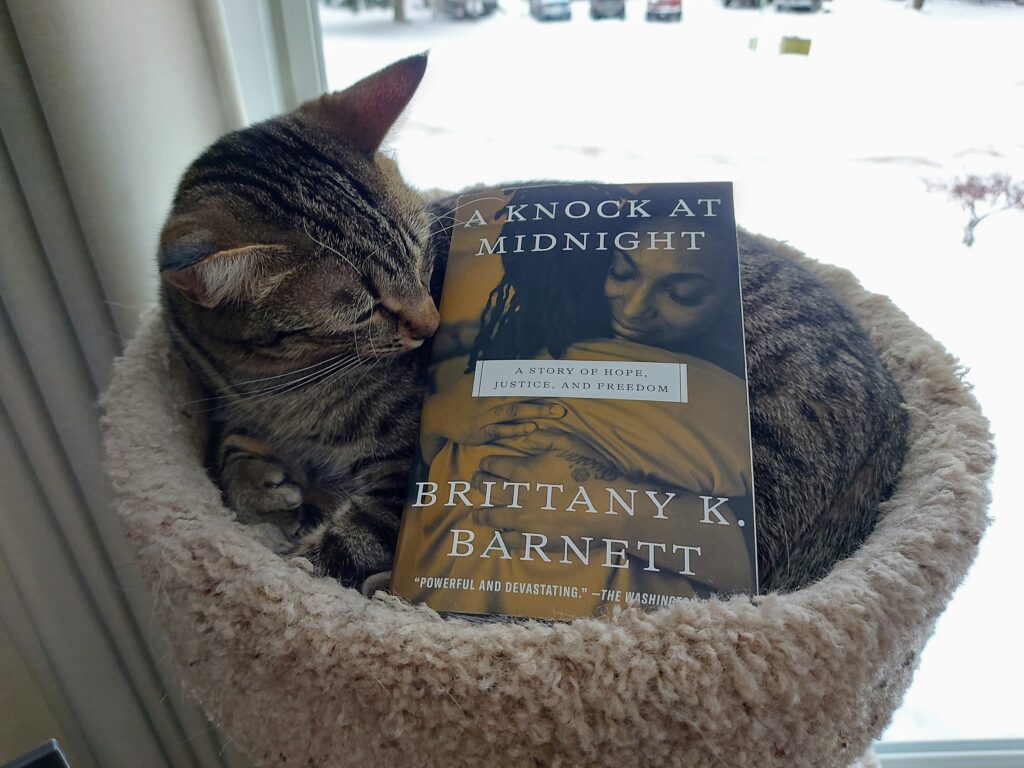A Knock at Midnight: A Story of Hope, Justice, and Freedom by Brittany K. Barnett

A Knock at Midnight is definitely making it onto the short list of the best books I have read this year. It is the remarkable true story of a young lawyer, Brittany K. Barnett, who takes on a racist criminal justice system and fights against the incarceration of Black people on drug charges in the US.
Brittany K. Barnett is a Black lawyer from Texas practicing corporate law when she comes across the story of Sharanda Jones, a Black woman who in 1999 was given a life sentence in prison without parole for a first-time drug offense. Sharanda’s story resonates with Brittany, whose own mother was a drug addict who spent two years in prison for drug related offenses. Sharanda was a single mother who was running two businesses when she decided to make some extra money by transporting drugs from a supplier to two of her friends who were drug dealers. By the time federal prosecutors homed in on her and decided to make her out to be some kind of drug queenpin, Sharanda had stopped transporting drugs. But that did not stop federal prosecutors from arresting her and stacking charges against her. With no physical evidence and relying on the false testimony of the supplier and her two drug dealer friends (who gave false testimony in exchange for reduced sentences), Sharanda was given a mandatory sentence of life in prison for conspiracy to distribute crack cocaine.
Almost half of the people in US federal prison serving life without parole have been convicted of a drug offense, and 80 percent of these people are people of colour. Some pedophiles, rapists and murderers spend less time in prison for their crimes. Why are so many people serving life sentences for drug charges, and why are so many of them people of colour? Because of Reagan’s War on Drugs and the Anti-Drug Abuse Act of 1986 that changed the sentencing for possession of crack cocaine, which is more likely to be used by poor (Black) Americans, making the sentencing harsher than for powder cocaine, which is more likely to be used by affluent white Americans. The racist socio-economic circumstances of Black Americans has trapped them in a modern form of slavery where they turn to selling drugs in order to make money just to survive.
The laws have changed since then, making sentencing for possession of crack cocaine less harsh, but the new laws were not retroactively applied to people already serving life sentences. Sharanda’s only hope to get out of prison is to get a presidential pardon from President Obama. Brittany takes Sharanda, and some other Black prisoners, on as pro bono clients to help them with their applications for clemency. I suggest you do not Google anything about this book, Brittany K. Barnett, and Sharanda Jones before reading A Knock at Midnight and allow yourself to be carried away by Brittany’s intense race against time to secure clemency for Sharanda and her other clients before President Obama’s second term is over and the Cheeto in Chief takes over.
Brittany K. Barnett is an amazing person, and her work ethic is just astounding. For years she juggled dual workloads as a busy corporate attorney and helping numerous clients through the clemency process, as well as advocating for judicial reform. A Knock at Midnight is well written and a beautifully empathic story. Brittany does not get bogged down in statistics and legalese; A Knock at Midnight is first and foremost a story about the people who populate it. Brittany takes time for the reader to get to know her own story and she takes time for the reader to get to know every one of the prisoners that she helps so that we sympathize with each of their situations and understand why they would become involved in the drug trade. Was Sharanda wrong to transport drugs? Yes, she was. Does she deserve to spend the rest of her life in prison, separated from her daughter, for doing it? No, definitely not. Whether or not you think otherwise, I implore you to read this book.